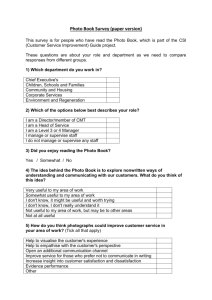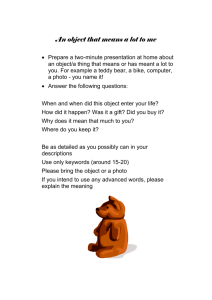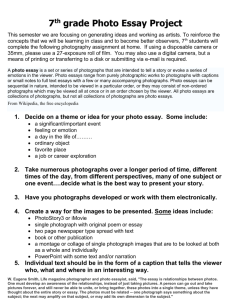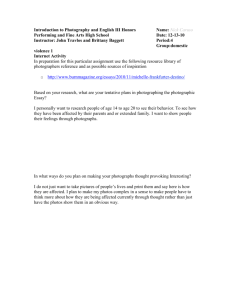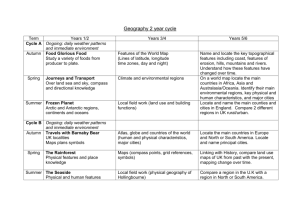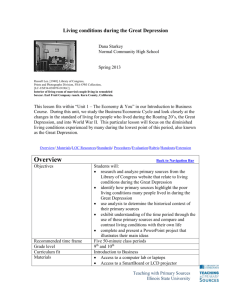4-5 Language Arts
advertisement
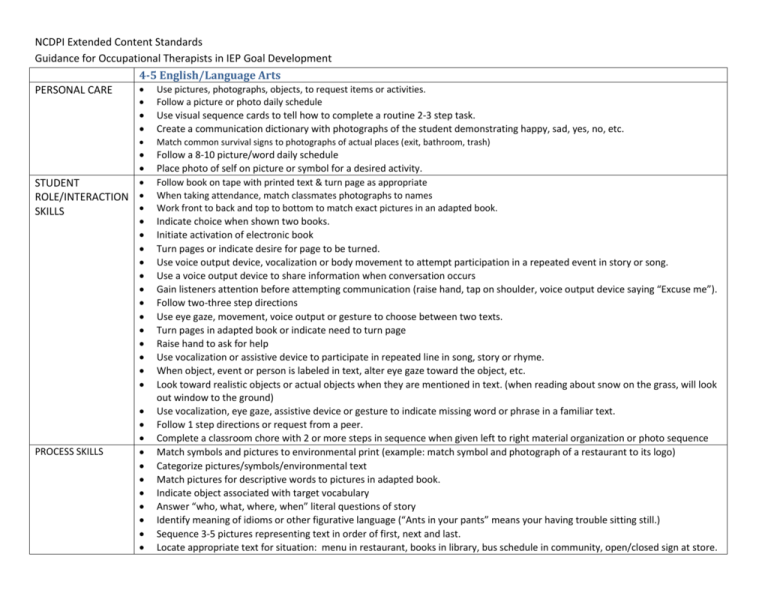
NCDPI Extended Content Standards Guidance for Occupational Therapists in IEP Goal Development 4-5 English/Language Arts Use pictures, photographs, objects, to request items or activities. PERSONAL CARE Follow a picture or photo daily schedule Use visual sequence cards to tell how to complete a routine 2-3 step task. Create a communication dictionary with photographs of the student demonstrating happy, sad, yes, no, etc. Match common survival signs to photographs of actual places (exit, bathroom, trash) STUDENT ROLE/INTERACTION SKILLS PROCESS SKILLS Follow a 8-10 picture/word daily schedule Place photo of self on picture or symbol for a desired activity. Follow book on tape with printed text & turn page as appropriate When taking attendance, match classmates photographs to names Work front to back and top to bottom to match exact pictures in an adapted book. Indicate choice when shown two books. Initiate activation of electronic book Turn pages or indicate desire for page to be turned. Use voice output device, vocalization or body movement to attempt participation in a repeated event in story or song. Use a voice output device to share information when conversation occurs Gain listeners attention before attempting communication (raise hand, tap on shoulder, voice output device saying “Excuse me”). Follow two-three step directions Use eye gaze, movement, voice output or gesture to choose between two texts. Turn pages in adapted book or indicate need to turn page Raise hand to ask for help Use vocalization or assistive device to participate in repeated line in song, story or rhyme. When object, event or person is labeled in text, alter eye gaze toward the object, etc. Look toward realistic objects or actual objects when they are mentioned in text. (when reading about snow on the grass, will look out window to the ground) Use vocalization, eye gaze, assistive device or gesture to indicate missing word or phrase in a familiar text. Follow 1 step directions or request from a peer. Complete a classroom chore with 2 or more steps in sequence when given left to right material organization or photo sequence Match symbols and pictures to environmental print (example: match symbol and photograph of a restaurant to its logo) Categorize pictures/symbols/environmental text Match pictures for descriptive words to pictures in adapted book. Indicate object associated with target vocabulary Answer “who, what, where, when” literal questions of story Identify meaning of idioms or other figurative language (“Ants in your pants” means your having trouble sitting still.) Sequence 3-5 pictures representing text in order of first, next and last. Locate appropriate text for situation: menu in restaurant, books in library, bus schedule in community, open/closed sign at store. PLAY WRITTEN COMMUNICATION Follow written directions to complete a task that involves 1-2 areas of the classroom Match the correct source to the requested information; yellow pages to “where is the Pizza delivery number”- sale paper for “How much is a box of Cheerios”- menu to “How much is a taco”, etc. Complete a new activity with 3-step visual text When given picture directions, gather materials needed to complete an activity Use pictures from within text to identify additional information related to text (picture shows snow on the ground, identify that it is cold in the story) Match simple symbols with appropriate representations of function (empty tissue roll to picture of bathroom) Arrange scrambled word cards into a sentence Choose between upper/lower case letters to spell name Indicate action words read in text (hold up picture of boy running while appropriate passage is read in story) Locate name in print when given a matching card. Match words to environmental icon (word McDonalds to picture of logo) Use cook book, phone book, sale paper, etc. to locate requested information. Create a list needed to complete a specified task (self-care, construction activity, etc.) Alphabetize 8 of 10 letters by first letter Retell an activity student has participated in (during free play or recess) using 2-3 complete sentences Use pictures to answer who, what, and where questions about an actual event (during recess or free play) Use a prop to act out one scene from a familiar story Create a graph/chart of classmates preferences about characters Given a map of the story setting, draw a line to show the path the character took (show sequence of events) Draw a simple picture then “write” about the picture and retell on request Use computer to generate a literacy project; activate printer to print out literacy product Sequence labeled pictures to tell a story and write story using the words Add pictures or photos to a communication log to convey information about the day Circle/highlight/mark 2-3 picture/photo to convey information about the day Use capital letter in first word of sentence Capitalize names of familiar people and places Type letters of first and last name Write simple sentence using pictures or words Color in a specified area to create an appropriate illustration to a story Draw and label a picture relating to a story read aloud Type simple sentences on computer and print independently Trace letters of first name Demonstrate ability to keep marks in confined boundary (on paper, white board, etc) Use jig or trace first and last name Copy first and last name from a live model
